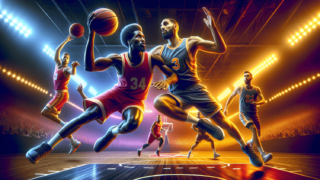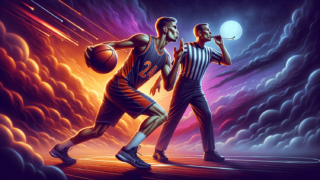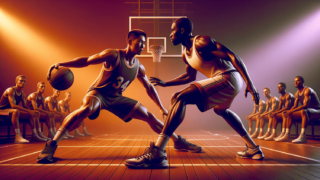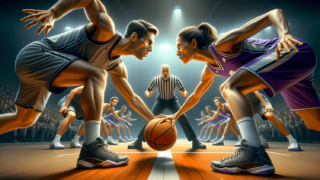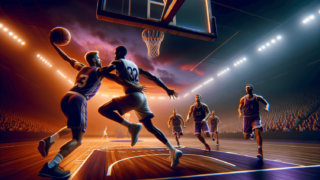
Are you ready to dive into the dramatic world of basketball acting? If so, then you’re in the right place to explore the infamous flop! In this engaging blog post, we’ll delve into the theatrical act that has become synonymous with some players’ attempts to draw fouls, sparking heated discussions and debates amongst fans, players, and referees alike. So, fasten your seatbelts as we take you on a thrilling journey through the ins and outs of the much-debated basketball flop – an act so cunning, it has the power to turn the tides of a game within moments!
What’s a Flop in Basketball?
A flop in basketball is a deliberate act performed by a player to exaggerate or simulate contact with an opponent to draw a foul call from the referee. This tactic can be used offensively or defensively, and is often considered unsportsmanlike as it attempts to manipulate the outcome of a play by deceiving the officials.
Why Players Flop
Flopping is an art as much as it is a contentious issue in basketball. Players resort to flopping as a strategic move to gain an advantage over the opposing team by drawing fouls or triggering foul trouble for key opposing players. This disrupts the rhythm of the game and alters the way coaches establish their game plan. Flopping can result in extra free throws, possession of the ball, or taking a crucial opponent out of the game. Imagine a crucial match-up where one team systematically targets the opposing team’s star, ultimately causing them to foul out or play a less aggressive defense. This is the power of the flop!
How to Identify a Flop
Body Language
While recognizing flops can be challenging, there are certain signs and giveaways that can help you identify them. The first step is to observe the player’s body language. Most players who flop will exaggerate their reaction to contact as if they are hit incredibly hard. This often involves flailing arms or legs, a sudden and unnatural head jerk, or an abrupt fall to the floor. In many instances, the actual contact does not warrant such a dramatic reaction, and this discrepancy in force is a telltale sign of a flop.
Timing and Context
The game’s context can also influence the likelihood of a flop. You’re more likely to witness a flop when the game is tense, a star player is in foul trouble, or the match is in the final minutes. High-profile games, for instance, during playoffs or championships, are known for yielding a higher number of flops.
Types of Flops in Basketball
Charge Flop
One of the most frequent types of flops in basketball is the charge flop. This happens when a defending player intentionally takes a fall after minimal contact from an offensive player. Ideally, the defender attempts to position themselves in the path of a driving player, and the slightest contact is embellished to make it seem like a charge. If successful, this results in a turnover and the offensive player being charged with a personal foul. This can be potentially game-changing if the offensive player is a crucial component of their team.
Blocking Foul Flop
In contrast to the charge flop, the blocking foul flop occurs when an offensive player simulates contact against an established defender. This type of flop typically involves a driving player lunging into a defender’s path and then acting as though they received significant contact. The goal here is to convince the officials that the defender impeded their progress, hence the blocking foul.
Rebounding Flop
Rebounding flops take place in the post when a player is trying to secure a rebound. Players often use subtle but effective embellishments such as sudden jerky movements, falling to the ground after a box-out, or extending their arms theatrically to create the illusion of being shoved or held. The goal here is to make it appear as though the opposing player made an illegal move, resulting in a personal foul and potentially gaining the rebounder a trip to the free-throw line.
Shot Flop
Shot flops are employed by shooters who feel contact as they go up for a shot. They will exaggerate their body movements or even manipulate their shooting form upon feeling contact, making it appear as though they were hit during the shot attempt. Referees might get tricked into awarding free throws, giving the shooter more opportunities to score points.
The NBA’s Stance on Flopping
The National Basketball Association (NBA) has recognized the rising concerns related to flopping and has implemented rules and sanctions to discourage players from resorting to this tactic:
Warnings and Fines
A player guilty of a flop receives a warning on their first offense, followed by subsequent fines for every additional infraction. Starting with $5,000 for the second offense, the fines incrementally increase up to $30,000 for the fifth offense. Repeat offenders risk suspension if they reach the sixth infraction.
Video Review
NBA officials will review plays during halftime or post-game for potential flops that warrant a penalty. This process ensures that officials do not miss any egregious flops during the course of the game, as well as helps ensure that the correct calls are made.
Playoff Rules
It is important to note that the penalties for flopping during the NBA playoffs are different from those in the regular season. A single flopping offense during the playoffs incurs an immediate fine, with no warnings given. The fines start at $5,000 and gradually increase up to $30,000, with a suspension possible for any subsequent offenses.
Tips to Enjoy Basketball without Flopping
As a fan or player, embracing basketball in its purest form is essential for both Ethics and enjoyment of the game. Here are some tips to foster a flopping-free basketball experience:
Role Models
Look up to players who exhibit good sportsmanship and fair play, rather than those notorious for theatrical flops. Simulating contact undermines the integrity of the game and shows poor sportsmanship, making players who refrain from flopping ideal role models.
Appreciate True Skill
Focus on the skills and techniques that make basketball an incredible sport. The beauty of basketball lies in the talent, athleticism, and teamwork displayed on and off the court. Flopping is not part of the true essence of the game and should not be celebrated.
Voicing Opinions
As fans or players, it is important to voice disagreement or displeasure with flopping’s influence on the game. Engaging in discussions and forums, or supporting players who condemn flopping, can help discourage this behavior within the basketball community.
Preparing for a Flop-Free Basketball Game
Whether you’re a player, coach, referee, or fan, there are ways to safeguard the integrity of basketball and mitigate the effects of flopping:
Maintaining Composure
Staying composed when you suspect an opponent of flopping is essential. Players should refrain from overreacting, committing unnecessary fouls, or becoming excessively frustrated. Instead, focus on consistent controlled play, solid defense, and teamwork to diminish the effectiveness of unsportsmanlike tactics.
Acquiring Knowledge
Understanding the game’s rules and knowing what constitutes a flop will empower you to recognize and address it effectively. Developing expertise can help you provide a valuable perspective in conversations about the impact of flopping on the game.
Effective Officiating
The role of an official in managing the game and identifying potential flops cannot be understated. Referees should engage in continuous training to enhance their ability to discern between legitimate fouls and flops, ensuring that the integrity of the game is preserved.
With these tools and perspectives in mind, the basketball community can work toward an environment that values fair play and sportsmanship above all. Armed with this knowledge, you’ll enjoy the game even more and contribute to the ongoing conversation about flopping in basketball.
Preventing and Reducing Flopping
Though it is primarily the responsibility of leagues and officials to take a stance against flopping, both players and fans can also play a significant role in curbing this behavior. Here are some steps individuals can take to minimize the prevalence of flopping in basketball:
Participate in Discussions and Debates
Engage in conversations about flopping on social media, forums, and at your local courts. By discussing the issue and raising awareness, fans can actively contribute to the narrative that discourages unsportsmanlike behavior on the court.
Encourage Good Sportsmanship
Whether you’re a parent, coach, or fellow player, emphasize the importance of good sportsmanship in all aspects of the game. Teach young players to prioritize skill, teamwork, and fair play over seeking shortcuts, such as flopping, to gain an advantage.
Highlight Positive Role Models
Share stories and highlight examples of basketball players who have built their careers on skill and sportsmanship. By focusing on positive role models, the basketball community can create a culture that aspires to play the game with integrity and respect.
Coaches and Referees Battling Flops
Coaches and referees play a critical part in creating an atmosphere that favors fair play and sound basketball fundamentals over unsportsmanlike behavior like flopping. Here’s how they can contribute:
Emphasize Team Ethics
Coaches should stress the importance of team ethics, emphasizing a culture that discourages flopping and prioritizes fair play. Setting team standards and expectations can play a significant role in curbing flopping behavior and fostering a healthier competitive environment.
Strong Officiating
Referees should continuously enhance their knowledge of the game and their ability to recognize flops. Building expertise in identifying flops and making just calls will contribute to upholding the overall integrity of the sport.
Training and Communication
Basketball governing bodies should facilitate training programs and development opportunities for referees, coaches, and even players, which focus on distinguishing legitimate fouls from flops. Open channels of communication between league officials, coaches, and players can also go a long way in establishing a better understanding of the game’s rules and promoting sportsmanship.
Is Flopping Unique to Basketball?
While flopping is a notable aspect of basketball, it is not an issue exclusive to the sport. Various other sports, such as soccer, American football, and even hockey, have their own versions of flopping, diving, or embellishment to draw fouls, penalties, or advantageous calls. However, basketball’s nature – characterized by its physicality, speed, and dynamic gameplay – makes flopping a particularly significant and controversial aspect of the sport.
These insights and strategies can contribute to fostering a basketball culture that prioritizes fair competition and skill development. By embracing the essence of the game and working together to minimize unsportsmanlike behavior, the basketball community can continue to enjoy the sport while protecting its integrity.
Frequently Asked Questions
Here is a compilation of frequently asked questions about flopping in basketball to help you better understand and navigate this controversial aspect of the game. This FAQ section offers concise and informative answers to some common queries and concerns related to flopping.
1. Do all basketball players flop?
No, not all basketball players resort to flopping. While some players have gained notoriety for their flopping tendencies, many players focus on fair play, skill, and sportsmanship when competing.
2. What is the primary motivation behind flopping?
The primary motivation behind flopping is to gain an advantage through deception. Players attempt to draw fouls and initiate foul trouble for opponents, disrupting their game plan and potentially earning extra points through free throws.
3. Is flopping a foul in basketball?
Flopping is not considered a conventional foul in basketball. However, NBA rules specifically target flopping and penalize players deemed to have flopped to discourage this behavior.
4. How can I tell if a player is flopping?
Discerning whether a player is flopping can be challenging. Look for exaggerated reactions to contact or discrepancies between the actual contact and the player’s reaction. Analyzing the game’s context and timing can also provide clues to potential flops.
5. What is the penalty for flopping in the NBA?
In the NBA, the penalty for flopping starts with a warning for the first offense, followed by fines for additional infractions, incrementally increasing from $5,000 to $30,000. Players risk suspension for continued offenses, and penalties differ during the playoffs.
6. What are the most common types of flops?
Common types of flops include charge flops, blocking foul flops, rebounding flops, and shot flops, all of which involve exaggerated reactions to contact to deceive officials and draw fouls.
7. Can coaches be penalized for player flopping?
Coaches themselves are not directly penalized for player flopping; the penalties fall on the players who commit the flop. However, coaches play a crucial role in fostering a team culture that discourages flopping and promotes fair play.
8. Are there any strategic advantages to flopping?
Although flopping is considered unsportsmanlike, players resort to this tactic in an attempt to gain strategic advantages such as drawing fouls, earning additional free throws, and potentially forcing key opposing players to foul out or play less aggressively.
9. How can fans discourage flopping?
Fans can discourage flopping by participating in discussions, promoting good sportsmanship, and highlighting positive role models who prioritize skill and fair play over deception.
10. How do referees identify flops?
Referees are trained to observe player reactions to contact, examine the context and timing of the play, and use knowledge of the game’s rules to differentiate between legitimate fouls and flops.
11. How do other sports handle flopping?
Other sports, such as soccer, American football, and hockey, also grapple with the issue of flopping or diving to gain an advantage. Each sport has its own rules and penalties in place to discourage such behavior and maintain the integrity of the game.
12. Can flopping be completely eliminated from basketball?
Completely eliminating flopping from basketball may be difficult, but raising awareness, implementing strict penalties, and fostering a culture of fair play can significantly reduce the prevalence and impact of this unsportsmanlike tactic.
13. What can I do as a local coach or sports administrator to reduce flopping?
As a coach or sports administrator, you can establish clear team policies against flopping, foster a culture of sportsmanship, facilitate educational programs for players and coaches, and maintain open communication with referees and league officials to discourage the practice of flopping.
Featured Posts
- No pillar pages found.
